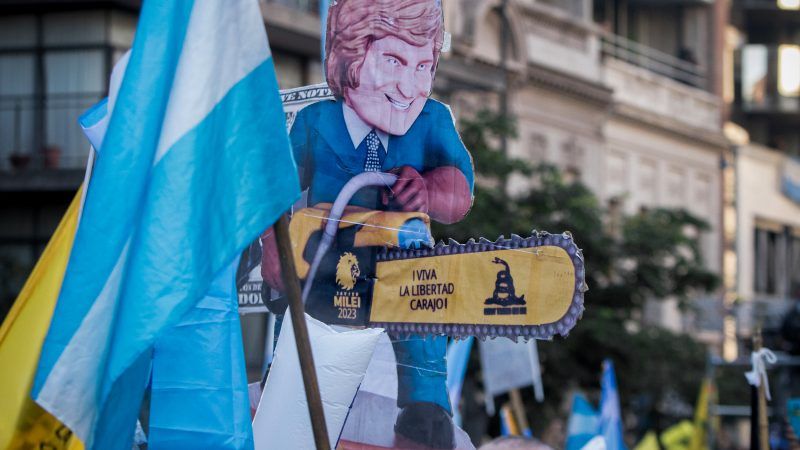Milei Begins Shock Therapy in Argentina
The self-described anarcho-capitalist president devalued the peso, halved government ministries, and announced a series of spending cuts.

When Javier Milei assumed the presidency of Argentina on Sunday, he promised to shock the country's economy to end its economic crisis. In his first acts as president, the self-described anarcho-capitalist devalued the peso, halved government ministries, and announced a series of spending cuts.
On Tuesday, Milei's new administration announced a sharp currency devaluation, weakening the peso by more than 50 percent. As a result, the official exchange rate increased from 366.5 per dollar to over 800.
After years of previous administrations forcefully slowing the peso's decline, the central bank also set a monthly devaluation target of 2 percent in an attempt to anchor inflation.
"We're always worse off because our response has been to attack the consequences but not the problem," Economy Minister Luis Caputo said in a televised address. "What we've come to do is the opposite of what they always did, and that's solve the root problem."
"For a few months, we're going to be worse than before," Caputo said, adding that the government plans to double social welfare programs to help the poor absorb the shock.
In another bold act, the chainsaw-wielding president cut the number of federal ministries by half, from 18 to nine. Only the ministries of foreign affairs, economy, security, defense, human capital, justice, infrastructure, health, and internal affairs remain. Meanwhile, the ministries of transport, public works, science, culture, territorial development and habitat, tourism, livestock and agriculture, and women's affairs were either eliminated or recombined.
Going forward, the government has announced a series of spending cuts to solve Argentina's "addiction to fiscal deficit." It plans to cut spending equivalent to 2.9 percent of its gross domestic product by reducing energy and transport subsidies and cutting security and pensions.
Other measures include reducing transfers to provincial governments, restoring personal income taxes, and increasing import taxes. With public employment accounting for 18 percent of the country's total employment, the administration also announced that it will carry out an extensive review of contracts and that contracts less than a year old will not be renewed.
Argentina's left has promised to fight against Milei's shock therapy plans. The governor of Buenos Aires, Axel Kicillof, promised to "fight boldly" against the new measures. Union founder Juan Grabois called Caputo "a psychopath" on the verge of committing "social murder."
But International Monetary Fund (IMF) spokesperson Julie Kozack welcomed the government's "bold initial actions" that "aim to significantly improve public finances in a manner that protects the most vulnerable in society and strengthen the foreign exchange regime."
"Their decisive implementation will help stabilize the economy and set the basis for more sustainable and private-sector led growth," she wrote in a statement.
The results of the shock can already be seen: Argentine sovereign bonds rose to the highest in two years after Caputo announced the measures. By Wednesday, the benchmark 2035 bond "added as much as 1.4 cents to trade at 35 cents on the dollar," according to BNN Bloomberg.
Milei's Argentina is facing rapidly rising inflation, a 40 percent poverty rate, a $43 billion trade deficit, and debt, including $45 billion owed to the IMF. To save the country's economy, Milei promised a tough pill to swallow. That is exactly what he has delivered in his first week as president of Argentina.


Show Comments (55)